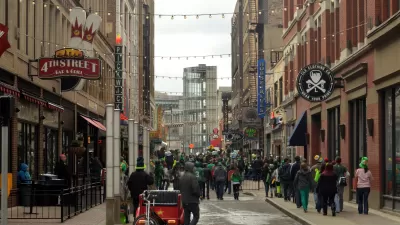Moving families from segregated, high poverty neighborhoods, into desegregated "areas of opportunity" has multiple effects. Housing mobility programs help revitalize communities and improve the physical and mental health of families involved.
Phil Tegeler (Poverty and Race Research Action Council) and Salimah Hankins (American Civil Liberties Union) profile the Baltimore's HUD supported Housing Mobility Program in Shelterforce's latest issue "Are Our Neighborhoods Making Us Sick?"
Housing segregation is widely cited as a cause of racial health disparities, and research supports the hypothesis that these disparities effect vulnerable children in the most severe ways. Reduction in rates of asthma, diabetes, obesity, and mental health conditions in families moving from high-poverty areas into low-poverty neighborhoods (like those in the Baltimore program) is well documented and "the savings to the public health system alone could pay for these moves many times over."
Tegeler and Hankins argue that leaders of housing mobility programs need to share stories about these health improvements with HUD to encourage them to move forward with the mobility agenda. But that won't be enough if civil rights groups are the only advocates at the table. As the authors point out, "we need our colleagues in the community development field to support mobility programs as a necessary complement to building stronger, healthier low- and mixed-income communities."
Thanks to Brittany Stanley
FULL STORY: Prescription for a New Neighborhood

Alabama: Trump Terminates Settlements for Black Communities Harmed By Raw Sewage
Trump deemed the landmark civil rights agreement “illegal DEI and environmental justice policy.”

Study: Maui’s Plan to Convert Vacation Rentals to Long-Term Housing Could Cause Nearly $1 Billion Economic Loss
The plan would reduce visitor accommodation by 25% resulting in 1,900 jobs lost.

Planetizen Federal Action Tracker
A weekly monitor of how Trump’s orders and actions are impacting planners and planning in America.

Waymo Gets Permission to Map SF’s Market Street
If allowed to operate on the traffic-restricted street, Waymo’s autonomous taxis would have a leg up over ride-hailing competitors — and counter the city’s efforts to grow bike and pedestrian on the thoroughfare.

Parklet Symposium Highlights the Success of Shared Spaces
Parklets got a boost during the Covid-19 pandemic, when the concept was translated to outdoor dining programs that offered restaurants a lifeline during the shutdown.

Federal Homelessness Agency Places Entire Staff on Leave
The U.S. Interagency Council on Homelessness is the only federal agency dedicated to preventing and ending homelessness.
Urban Design for Planners 1: Software Tools
This six-course series explores essential urban design concepts using open source software and equips planners with the tools they need to participate fully in the urban design process.
Planning for Universal Design
Learn the tools for implementing Universal Design in planning regulations.
Caltrans
Smith Gee Studio
Institute for Housing and Urban Development Studies (IHS)
City of Grandview
Harvard GSD Executive Education
Toledo-Lucas County Plan Commissions
Salt Lake City
NYU Wagner Graduate School of Public Service



























